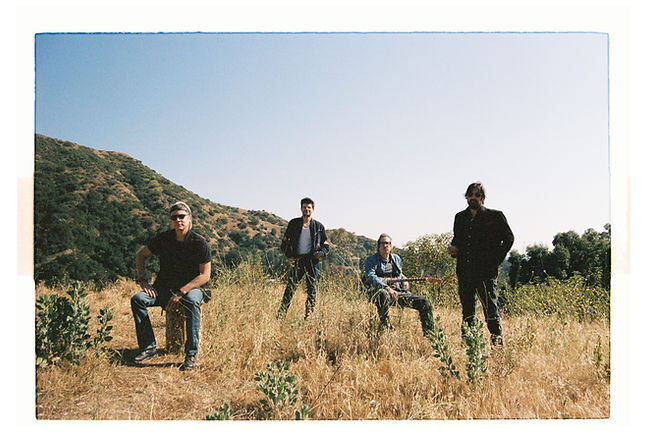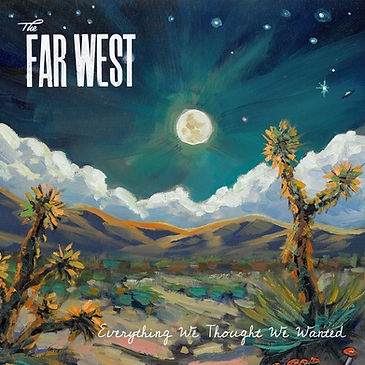THE FAR WEST


EVERYTHING WE THOUGHT WE WANTED
RELEASED ON 9.26.25
STREAM / DOWNLOAD
The Band:
Brian Bachman, drums and backing vocals
Aaron Bakker, guitar and backing vocals
Robert Black, bass and backing vocals
Lee Briante, guitar, harmonica, vocals
Michael Whiteside, piano, organ, keys, backing vocals
Life sometimes has a way of complicating the process of making a record, which is never an easy task to begin with.
So it was in the case of Everything We Thought We Wanted, the third album by the gifted Los Angeles country/Americana band The Far West, and their first for the Blackbird Record Label. Childbirth, a national pandemic, missing masters, and the catastrophic Eaton fire that leveled Southern California’s Pasadena/Altadena area in January 2025 — this story has everything.
By the time The Far West started making their new record in 2016, they had established themselves with their first two recordings, a self-titled 2011 set recorded by producer Colin McClean at the American Legion Hall in Encinitas, California, where they established a residency, and Any Day Now, the 2014 sequel for Medina River Records, cut in the the vintage hot rod shop where McClean worked. Songwriter-bassist Robert Black describes their early approach as “kind of a punk rock ethos — it was one take, maybe two takes tops, first take, best take.”
Those releases and live appearances at the Grand Ole Echo, the popular Sunday afternoon Americana showcase in L.A.’s Echo Park neighborhood (whose operators Ben Redell and Matt Farber ran the Medina River imprint), and such other venues as the Hotel Cafe, the Satellite, and Joshua Tree’s celebrated Pioneertown hangout Pappy & Harriet’s, led to appearances opening for such stars as Lucinda Williams , Jackson Browne, Steve Earle, Justin Townes Earle, Ray Wylie Hubbard, Corb Lund, and Phil and Dave Alvin.
In the wake of that road work, Robert Black and fellow songwriter Lee Briante crafted a brace of new compositions distinguished by smart, piercing lyrics and deep, poignant emotion, not unlike what you hear in classic country songs penned by such masters as Hank Williams and Harlan Howard. “I don’t think it’s consciously, ‘Let’s write a sad song,’” Lee says. “We both write independently, but we have that commonality. That’s just what comes out. Both Robert and I have always been like that. I wouldn’t call our songs straight-up sad — they’re just real. It’s reality-of-life stuff.” Robert adds, “We've said from day one that we like to make horribly painful songs that you can dance to. That's been our philosophy.”
For their new record, The Far West got the opportunity to record for the first time in a real studio — though they had to be a little crafty about it. “We were sneaking into a school of audio engineering where one of the guys in the band was a teacher,” Robert says. “There was a great old Neve board in there. We’d sneak in at midnight, and work from midnight to 4 a.m.”
The first track cut for the record was “Hope I Don’t Bleed,” a darkly searing take on mortality that features a paint-peeling lead guitar performance by Dave Alvin, whose work with the Blasters and as a solo artist was a primary influence on both Lee and Robert.
Lee recalls, "We'd just come back from being out with Dave and Phil, and Dave had joined us on stage, which was huge for us because it was something we didn't think was going to happen. We were embarrassed to ask him anything, but we said, 'Hey man, you wanna sneak into the studio with us one day?' And he said, 'Sure, while I'm in town.' My son Aldo was born on a Sunday, and Dave came into town on that Sunday, so I left my wife in the hospital, because it was so important to us. I didn't want to do anything that might fuck it up, so I said, 'Hey, I'll be there.' Robert and the guys laid down a lot of work while I was at the hospital with my wife, and Dave was scheduled to come in at a certain time and I said, 'I'm not gonna miss this shit.' and with my wife's encouragement, I left and joined the guys.”
Sessions on the basic tracks were concluded on the band’s “borrowed” time. Then, Robert says, “COVID hit in 2020. We had all the basics, and we thought, ‘Let’s finish this thing. Our guitar player Aaron [Bakker] has a project studio and we can do all the overdubs and vocal tweaks there.’ We thought, ‘We’re not going to release this thing during COVID anyway, so let’s take our fucking time and make it sound the way we want it to, for once.’ "We were able to meet in person,” Lee continues. “Once it got more relaxed and people got a better understanding of COVID, we started meeting up in Altadena at Aaron's place. He had the equipment to get it done.”
The process allowed The Far West to pursue a deeper, more layered sound, employing additional musicians to extend their stylistic reach. Reflecting Lee and Robert’s affection for the soulful Southern sound of the Stax Records house band and Muscle Shoals’ Swampers, and such brass- inflected opuses as the Byrds’ The Notorious Byrd Brothers and the Band’s Rock of Ages, the Hollywood Horns and Nic Chaffee were drafted to add extra instrumental punch to “Meet Me Where We Parted Last” and “These Lies.” And for the heartrending, John Prine-styled out-of- love song “For the Birds,” Katie Stratton of the L.A. band the What Four came in to guest on harmony vocals.
Once finished, Everything We Thought We Wanted was a powerful and affecting collection of songs that represented a gigantic artistic leap for The Far West. And more than once it came within a hair’s breadth of never seeing the light of day. Robert remembers, “This record almost didn’t happen so many fucking times. During COVID, we tried to get the masters, and they were lost for something like eight months. Then we couldn’t get the hard drive to boot up. Then we finally got it done, and it all almost got burned down in the Eaton fire. The record was at Aaron’s place. I think he was away for the day. His plan was to not go back to the house for hours — but he thought, ‘Ah, I’ll just run up there and grab something to eat before I finish my day.’ He went up there, and the hill was on fire! He had just enough time to grab the best of his gear and the hard drive, and just run for his life. The fire was moving at the length of a football field a minute. Try to outrun that!”
That heroic sprint was worth it. Weaving its writers’ broad influences — the folk music of Phil Ochs, Dave Van Ronk, and Bob Dylan, the hardcore country of Waylon Jennings and Charlie Daniels, the pop-conscious ‘60s rock of the Beatles and Badfinger, the rootsy L.A. punk of X, the Gun Club, and Tex and the Horseheads — into a congruent, emotive, soulfully played whole, Everything We Thought We Wanted is a major step forward for one of Southern California’s most talented bands. But don’t take my word for it. Hear for yourself.
—Chris Morris, Los Angeles, May 2025 (Chris Morris is the author of Los Lobos: Dream in Blue and Together Through Life: A Personal Journey with the Music of Bob Dylan. He lives in Los Angeles.)